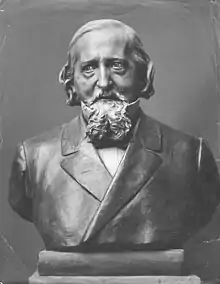Wilhelm Ahlwardt | |
|---|---|
 | |
| Born | July 4, 1828 Greifswald, Prussia |
| Died | November 2, 1909 (aged 81) Greifswald, Prussia, German, Empire |
| Academic background | |
| Alma mater | University of Greifswald University of Göttingen |
| Academic work | |
| Discipline | Oriental studies |
| Institutions | University of Greifswald |
Wilhelm Ahlwardt (4 July 1828, Greifswald – 2 November 1909, Greifswald) was a German orientalist who specialized in research of Arabic literature. He was the son of philologist Christian Wilhelm Ahlwardt (1760–1830).
Biography
He studied oriental philology at the University of Greifswald (1846–48, 1849–50) as a student of Johann Gottfried Ludwig Kosegarten and at the University of Göttingen (1848–49) under Heinrich Ewald. After graduation, he spent several years studying Arab manuscripts in libraries at Gotha and Paris. In 1856 he began work as an assistant librarian at Greifswald, obtaining his habilitation during the following year. In 1861 he became a professor at the university.[1]
Published works
His main work was the masterful Verzeichnis der arabischen Handschriften (1887–1899), a 10 volume catalogue of Arabic manuscripts kept at the Royal Library of Berlin.[2] As a dedication to the 400 year jubilee of the university at Greifswald (1856), he published Über Poesie und Poetik der Araber ("On Poetry and Poetics of the Arabs").[1] Other principal works by Ahlwardt are:
- Chalef elahmar's Qasside: Berichtigter arabischer Text, 1859 – (Khalaf al-Aḥmar's qasida).
- "The divans of the six ancient Arabic poets Ennabiga, 'Antara, Tharafa, Zuhair, 'Alqama and Imruulqais", Trübner & co., London, 1870 (in English).[3]
- Al-Fakhrî by Muḥammad ibn ʻAlī Ibn al-Ṭiqṭaqā (Paris, É. Bouillon, 1895).
References
- 1 2 Obituary Notices Journal of the Royal Asiatic Society of Great Britain & Ireland (New Series) / Volume 42 / Issue 02 / April 1910, pp 553-556
- ↑ "Ahlwardt, Wilhelm Theodor", Littmann, Enno in: New German Biography 1 (1953), p 112.
- ↑ OCLC Classify published works